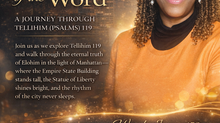The Bridge Builders; Spanning Divides with Faith, Dialogue, and Unity
- Oct 29, 2025
- 3 min read
📜 WBJMinistries Sermon
Title: The Bridge Builders — Unity Through Understanding Differences
Theme Scripture: “Endeavoring to keep the unity of the Spirit in the bond of peace.” — Eph’siym (Ephesians) 4:3, Halleluyah Scriptures

🙏🏼🤲🏼🙌🏼📿🛐🌍
Elohim, Source of all wisdom and unity, open our hearts today to see the bridges You have placed between us. Guide us to walk in understanding, to speak in dialogue that uplifts, and to honor the diversity of Your creation. May the light of Your presence illuminate our differences and bind us together in peace, through Yahusha.
Halleluyah.
📍 The Call to Bridge Building
In our world, division often appears stronger than connection. Nations clash, communities fracture, and even families struggle to understand one another. Yet, Eph’siym (Ephesians) 4:3 reminds us to endeavor to keep the unity of the Spirit in the bond of peace. The task of a bridge builder is not merely structural; it is relational, cultural, and spiritual. A bridge is built not by erasing differences but by understanding them, embracing them, and creating paths where dialogue can flow. Sociology: Cultural Pluralism and Intergroup Relations. Applied statistics show that societies embracing cultural pluralism, where multiple ethnic, religious, and cultural identities coexist, tend to report higher social trust and lower conflict rates. Anthropological studies reinforce this: communities that honor rituals, symbols, and narratives of all members cultivate resilience and cooperation. Bridges are built when we recognize that our neighbor’s truth is not always our own, yet it holds value in the larger mosaic of humanity. This principle is mirrored in world religions; Buddhism emphasizes compassion (Karuna) for all beings. Islam teaches respect and justice among diverse peoples. Mohegan traditions highlight interconnectedness with nature and community. Polish Catholic heritage emphasizes service and reconciliation.
Philosophy; Dialogue and Ethics
Martin Buber’s I-Thou philosophy teaches that genuine dialogue treats the other as a whole person, not a problem to be solved. Ubuntu, the African ethic, reminds us; “I am because we are.” Bridge builders approach every conversation with these principles; mutual respect, active listening, and acknowledgment of shared humanity. Similarly, the Kemetic Laws—Ma’at, the principles of truth, balance, and justice, guide us to act ethically and harmoniously across cultural divides.
Anthropology, Geography, and Law;
Across continents, humans have always built bridges; physically, symbolically, and spiritually. In Manhattan, bridges connect neighborhoods; in thought, they connect ideas. Anthropology teaches us that rituals, ceremonies, and shared spaces are cultural bridges. Geographically, bridges span rivers and valleys, echoing the metaphorical spans we must build between faiths and ideologies. Legally, human rights frameworks encourage intergroup understanding and dialogue. Peacebuilding requires adherence to justice and ethical standards. Ensuring that bridges are not imposed but mutually constructed. Scriptural Guidance. Bridges are spiritual and ethical endeavors, reinforced in scripture;📖 “Behold, how good and how pleasant it is for brothers to dwell together in unity.” — Tehilliym (Psalm) 133:1, Halleluyah Scriptures📜
📖“A soft answer turns away wrath, but grievous words stir up anger.” — Mishle (Proverbs) 15:1, Halleluyah Scriptures📜
📖 “Love your neighbor as yourself.” — Wayiqra (Leviticus) 19:18, Halleluyah Scriptures📜
📖“Let all that you do be done in love.” — Qorin’thyah Aleph (1 Corinthians) 16:14, Halleluyah Scriptures📜 These verses guide us to patience, empathy, and active peacemaking. Essential qualities for every bridge builder. Applied Statistics and Modern Implications. Studies in social networks demonstrate that communities with active interfaith and intercultural dialogues report 30–40% higher civic cooperation. Urban centers like New York City, with its rich cultural diversity, provide a living laboratory for these principles. By applying sociology and statistics, we can measure the effectiveness of dialogue programs, cultural festivals, and community peace initiatives.
Call to Action;🗣️ Become a Bridge Builder. Engage: Attend dialogues, interfaith events, and cultural festivals.
Listen: Approach every conversation with curiosity, not judgment.
Apply Ethics: Use the principles of Ma’at, Ubuntu, and scripture to guide decisions. Measure Impact: Track progress, like applied statistics, in relationships and community cohesion.
Unity is not uniformity. Bridges do not erase the river below; they span it. Our differences are not barriers, they are the materials for a stronger, more resilient connection.
🙏🏼🤲🏼🙌🏼📿🛐🌍
Elohim, may we see every difference as an opportunity to build, every conflict as an invitation to dialogue, and every heart as a partner in Your plan. Let us walk in the spirit of bridge builders, honoring our diverse heritages, our shared humanity, and Yahusha’s teachings. Strengthen us to be peacemakers and ambassadors of understanding.
Halleluyah.
Donation Reminder
Support the ministry’s mission of unity and interfaith dialogue. Your gift empowers programs, sermons, and outreach that build bridges across communities. Donate via Cash App: $WBJMinistries, Chime: $Wanda-Jones-153, or through our website: https://lightheartedfaithgiver.blogspot.com


















Comments